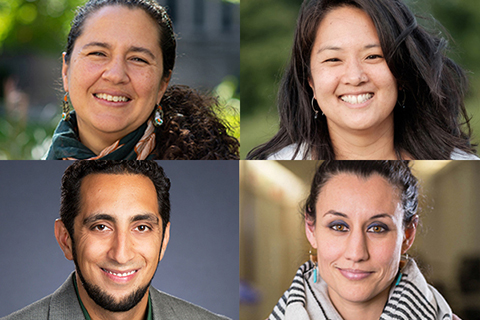Researchers Tackle Inequity in STEM Education

Four researchers and alumni from Northwestern University’s School of Education and Social Policy (SESP) will help address systemic inequities in PreK-12 STEM education as part of an esteemed National Academies’ committee.
The 16-member group includes SESP’s Megan Bang (PhD09), professor of learning sciences and psychology; Sepehr Vakil, assistant professor of learning sciences; Shirin Vossoughi, associate professor of learning sciences; and alumna Carrie Tzou (PhD08), professor of science education in the School of Educational Studies at the University of Washington Bothell. Bang also is a SESP alumna.
The committee will consider key challenges in current science, technology, engineering, and math education and draw up robust, evidence-based strategies for equitable STEM teaching and learning.
The Committee on the Equity of PreK12 STEM education is supported by the National Academies Board on Science Education (BOSE) with the National Academy of Engineering (NAE). The National Academies of Sciences, Engineering, and Medicine are private, nonprofit institutions that provide expert advice on some of the most pressing challenges facing the nation and world. Their work helps shape sound policies, inform public opinion, and advance the pursuit of science, engineering, and medicine.
Learn more about our committee members:
MEGAN BANG
Bang, senior vice president at the Spencer Foundation, studies ways we can create education systems that cultivate just, sustainable, and culturally thriving communities. She particularly wants to know how education, instead of being a source of trauma and assimilation, has the potential to contribute to Indigenous communities—and all communities.
Bang’s research suggests education isn’t confined to schools. Families are vital sources of education and learning; education is also tied to our relationship with land and water, she says.
An elected member of the National Academy of Education, she currently serves on the Board of Science Education at the National Academy of Sciences. She served on the Education and Human Resources Advisory Committee & Advisory Committee for Environmental Research and Education at the National Science Foundation. She received the American Education Research Association Mid-Career Contribution Award, the Division K, Teaching and Teacher Education, Early Career Award, and the Bobby Wright Award for Early Career Contributions to Research in Indigenous Education.
SEPEHR VAKIL
Vakil studies the intersections of technology and education, the politics and possibilities of engineering and computer science education across diverse global contexts, and issues of equity, identity, and race in STEM learning contexts.
He was recently awarded a Faculty Early Career Development (CAREER) Award from the National Science Foundation to investigate new ways to conceptualize and design technology learning for high school and undergraduate students.
That project, called Investigation of Learning Contexts Considering Ethical, Racial, and Disciplinary Identities of Students in Engineering and Computer Science has seeded Vakil's TREE Lab. Another initiative, called the Young People’s Race Power and Technology Project (YPRPT), brings together undergraduate students at Northwestern with local high school students along with activists, artists, and technology experts to investigate the impact of artificial intelligence and big data technologies on marginalized communities in the Chicago area.
Another current project, funded by the Spencer Foundation, uses oral histories and archives to examine the interplay between culture, religion, and politics in the founding and early formation of Sharif University, one of the most significant technical universities in the Middle East. Vakil is particularly interested in how globalizing and historicizing our understanding of engineering education can expand our imaginations for what ethical and socially responsible STEM education might look like across diverse contexts.
SHIRIN VOSSOUGHI
Vossoughi partners with students and teachers to research the social, historical, political, and ethical dimensions of learning. She is particularly interested in the conditions that foster educational dignity, the ethics of design and research with minoritized communities, and the relationships between learning and social change.
Her research argues that the best path to educational justice isn’t solely child- or adult-centered, but intergenerational and expansive. Her research has looked closely at student and teacher learning in the context of making/STEAM settings, writing and literacy instruction, and efforts to co-design transdisciplinary learning across teachers, researchers, students, and families.
Vossoughi has received numerous early career awards, including the AERA Division C Jan Hawkins Award for Early Career Contributions to Humanistic Research and Scholarship in Learning Technologies and the International Society of the Learning Sciences Early Career Award. She also recently received the Outstanding Paper of the Year Award from the Journal of the Learning Sciences, and several teaching and mentorship awards at Northwestern.
CARRIE TZOU
Tzou is the director of the Goodlad Institute for Educational Renewal. She studies equity-centered science learning environments for children and their families PreK-12, both in schools and in community-based settings.
She is a member of several professional organizations, including the National Association for Research in Science Teaching, the International Society of the Learning Sciences, and the American Educational Research Association. She received the Chancellor’s award for Distinguished Research, Scholarship, and Creative Practice at UWB in 2020. She previously served on the National Research Council committee for the PreK-5 science and engineering report.